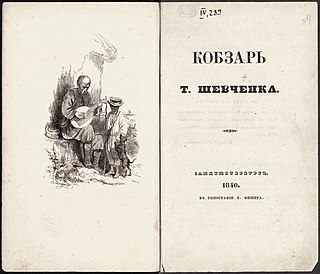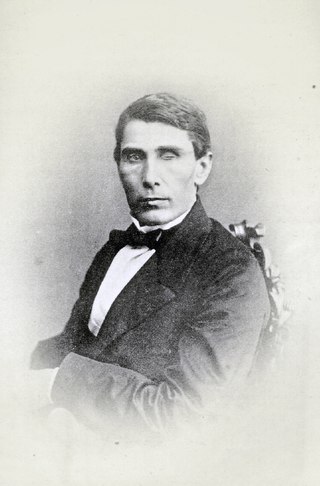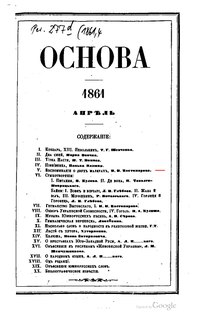Overview
In the Russian Empire expressions of Ukrainian culture and especially language were repeatedly persecuted, for fear that a self-aware Ukrainian nation would threaten the unity of the Empire.
In 1811, by the Order of the Russian government the Kyiv Mohyla Academy (established in 1632) was closed and outlawed.
In 1847, the Brotherhood of Sts Cyril and Methodius was terminated. The same year Taras Shevchenko was arrested and exiled for ten years, and banned for political reasons from expressing his views.
The journal was published monthly from January 1861 to September 1862 in St. Petersburg. Some of its texts were published in Russian.
Publishers:
Hanna Barvinok (real name Oleksandra Bilozerska-Kulish) who was Vasyl Bilozersky's sister and Panteleimon Kulish's wife also took part in the creation of the journal "Osnova". [4]
"The region, the study of which the "Osnova" will be devoted, is inhabited mainly by the southern Russian people," - said the magazine's program. The editorial board stated that it was "opening its journal for works in both native languages," emphasizing that "in our time, the question of whether it is possible and whether to write in Ukrainian is a matter of course". The editorial board of "Osnova" called to pay special attention to the "practical significance of the vernacular in teaching and preaching." [5]
In 1862, Pavlo Chubynsky associated with Osnova was exiled for seven years out of Ukraine to Arkhangelsk. [6] [7] The magazine Osnova was discontinued for financial reasons. [8]
Difficulties at the opening stage
The return of Taras Shevchenko gave a new powerful impetus to Ukrainian life in St. Petersburg. It is no coincidence that in the summer of 1858 the Ukrainian Community began to operate, aiming at publishing and educational activities. On her instructions, in October 1858, P. Kulish applied to the Ministry of Education for permission to publish the magazine "Khata" (full name: "Khata: South-Russian Journal of Literature, History and Agriculture"). Although the magazine was not supposed to be political, the ministry appealed to the Third Branch and rejected Kulishev on the basis of his recall. [9]
The refusal was due to his participation in the Cyril and Methodius Society ten years ago. As P. Kulish himself remarked: "the minister refused, and he refused, and it was me who did not, in fact, oppose the idea of the magazine". [10]
When a year later another relative of the Cyril and Methodius Society, a relative of P. Kulish V. Belozersky, applied to publish the magazine, the gendarmerie also objected, but less vigorously. After some time, permission was granted. It is possible that the measures of "enlightened people from St. Petersburg Russians" mentioned by P. Kulish in a letter to S. Aksakov helped. The first announcement of the forthcoming publication of the Fundamentals was published in June 1860, and the first issue was published in January 1861. [11]

Taras Hryhorovych Shevchenko was a Ukrainian poet, writer, artist, public and political figure, folklorist and ethnographer. He was a fellow of the Imperial Academy of Arts and a member of the Brotherhood of Saints Cyril and Methodius. He wrote poetry in Ukrainian and prose in Russian.

The Ems Ukaz or Ems Ukase, was an internal decree (ukaz) of Emperor Alexander II of Russia issued on 30 May [O.S. 18 May] 1876 banning the use of the Ukrainian language in print except for reprinting old documents. The ukaz also forbade the import of Ukrainian publications and the staging of plays or lectures in Ukrainian. It was named after the city of Bad Ems, Germany, where it was promulgated.

The Brotherhood of Saints Cyril and Methodius was a short-lived secret political society that existed in Kiev, at the time a part of the Russian Empire.
Ukrainian literature is literature written in the Ukrainian language.

Panteleimon Oleksandrovych Kulish was a Ukrainian writer, critic, poet, folklorist, and translator.

Apollon Nikolayevich Mokritsky was a Ukrainian painter of the Biedermeier period of Realist art. From 1849, he was a full member of the Saint Petersburg Academy of Arts.

Kobzar is a book of poems by Ukrainian poet and painter Taras Shevchenko, first published by Shevchenko in 1840 in Saint Petersburg, Russian Empire. Taras Shevchenko, born in Moryntsi, Kyiv Governorate, in what is now Ukraine, was nicknamed The Kobzar after the publishing of this collection. From that time on this title has been applied to Shevchenko's poetry in general and acquired a symbolic meaning of the Ukrainian national and literary revival.

Yevhen Pavlovych Hrebinka was a Ukrainian romantic prose writer, poet, and philanthropist. He wrote in both the Ukrainian and Russian languages. He was an older brother of the architect Mykola Hrebinka.

Marko Vovchok was a Ukrainian female writer of Russian descent. Her pen name, Marko Vovchok, was invented by Panteleimon Kulish. Her works had an anti-serfdom orientation and described the historical past of Ukraine. In the 1860s, Vovchok gained considerable literary fame in Ukraine after the publication in 1857 of a Ukrainian-language collection, "Folk Tales". In terms of literary fiction, Marko is considered to be one of the first influential modernist authors in Ukraine. Her works "shaped the development of the Ukrainian short story". Also, she enriched the Ukrainian literature with a number of new genres, in particular, the social story (Instytutka). The story "Marusya", translated and adapted into French, became popular in Western Europe at the end of the 19th century.

The known history of Bible translation into Ukrainian began in the 16th century with Peresopnytsia Gospels, which included only four Gospels of the New Testament.
The Ukrainian National Revival took place during a period when the territory of modern Ukraine was divided between the Austrian Empire, the Kingdom of Hungary and the Russian Empire after the partitions of Poland at the end of the 18th century. The period took place soon after the Haidamaka Uprisings rocked lands of former Cossack Hetmanate.
A hromada was an organization acting as part of a network of secret societies of the Ukrainian intelligentsia that appeared soon after the Crimean War. The societies laid a groundwork for emergence of the Ukrainian political elite and national political movement, which intensified with the January Uprising and issuing of the Valuev Circular. Many members of the hromadas had earlier belonged to the disbanded Brotherhood of Saints Cyril and Methodius.

Lyubov Yanovska was a Ukrainian writer and feminist.

Vasyl Mykhailovych Bilozersky was a Ukrainian political and cultural activist, journalist, scientist, pedagogue.

Matviy Nomys was a Ukrainian ethnographer, folklorist, writer and teacher. He is best known as an editor and publisher of one of the most comprehensive and authoritative collections of some of Ukrainian folklore genres, such as proverbs, sayings, riddles and so on.

Oleksandra Mikhailovna Bilozerska-Kulish, who commonly wrote under the pseudonym Hanna Barvinok, was a Ukrainian writer and folklorist. Considered one of the most important writers in Ukraine, she was the first female writer of modern Ukrainian literature and became a pioneer of ethnographic realism in Ukrainian writing.
Anna-Galya Gorbach, née Lutsyak was a Ukrainian literary critic, translator of Ukrainian literature into German, publisher, and public and political figure. Doctor of Philosophy, member of the National Writers' Union of Ukraine (1993), corresponding member of the Shevchenko Scientific Society in Europe, winner of the Ivan Franko literary prize (1994), the Vasyl Stus award of the Ukrainian Association of Independent Creative Intelligentsia (1993), the Triumph Award (2001), the Olena Teliga (2009), Panteleimon Kulish (2019). A wife of a Ukrainian philologist and publisher Oleksa Gorbach. One of the most famous and active personalities in the Ukrainian cultural and intellectual world of the Ukrainian diaspora.
Mykhailyna Khomivna Kotsiubynska was a Ukrainian literary critic, translator, and active participant of the Sixties movement. Laureate of many prestigious Ukrainian awards: Oles Biletsky Award (1993), Vasyl Stus Prize (1994), Antonovych Prize (1996), All-Ukrainian Literary Award named after Mykhailo Kotsiubinsky (1998), Olena Teliha Award (2001), Shevchenko National Prize (2009), Panteleimon Kulish Award. Knight of the Order of Princess Olga of the III degree (2006). Honored Worker of Science and Technology of Ukraine. Niece of the classic of Ukrainian literature Mykhailo Kotsyubynskyi.

The translation of the Bible by Panteleimon Kulish, Ivan Puluj and Ivan Nechuy-Levytsky, known as the Holy Scriptures of the Old and New Testament is the first complete translation of the Old Testament and the New Testament into the Ukrainian language, carried out mainly by Panteleimon Kulish with editorial and translation revisions by Ivan Puluj and the addition of translations by Ivan Nechuy-Levytskyi, which was published in 1903 in Vienna.













